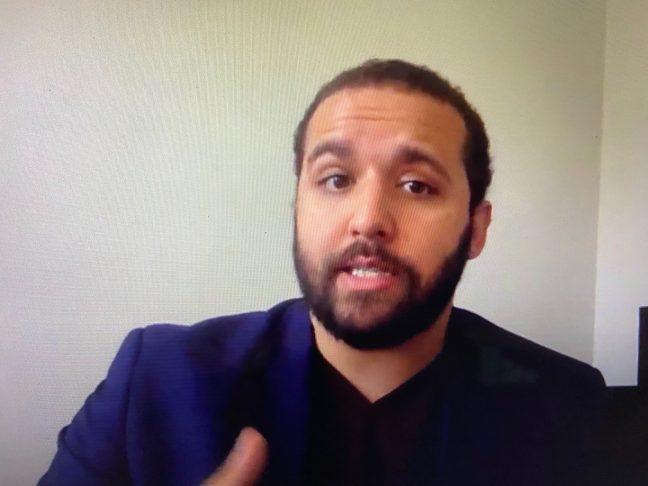Pulitzer Prize-winning journalist Wesley Lowery spoke with students in the University of Wisconsin School of Journalism and Mass Communication on Wednesday about the challenges of reporting on racial justice and the ethics of objectivity.
Lowery talked about his reporting experience and insight on issues of objectivity and diversifying newsrooms in SJMC’s Journalist in Residence series, “Journalism in Extraordinary Times.”
Lowery is a correspondent for “60 in 6” — a CBS 60 Minutes spinoff series. The two-time Pulitzer Prize-winning journalist is also the author of the book “They Can’t Kill Us All: Ferguson, Baltimore, and a New Era in America’s Racial Justice Movement.”
As social justice movements continue to sweep the nation and the UW campus, Lowery said social media and smartphones have changed the movements’ operations. Average Americans now have the power at their fingertips to communicate with mass audiences without going through traditional media gatekeepers, Lowery said.
“A lot of the stories of our moment are stories that kind of began at the bottom,” Lowery said. “When you think about a lot of these police shooting stories, when you think about the Me Too stories… These were not stories that some reporter cracked open and exposed to us. They were stories that began on social media with people talking about them, and that is what spurred the reporters to investigate.”
With these changes, Lowery said the media landscape has shifted to quicker news production, causing it to become slanted towards immediacy rather than other news values.
While Lowery said the vast majority of news organizations want to provide fair coverage, newsrooms must be willing to ask the hard questions to ensure the journalism produced reflects the professions’ true core values.
When home doesn’t feel like home: How racism in world, on campus continues in dorms
“We can’t conduct journalism in 2020 based on the rulebook written in 1980,” Lowery said. “Why? Because the players have changed, the actors have changed, the dynamics have changed.”
Through examining the roots of objectivity as a journalistic value, Lowery said newsrooms can evaluate their journalistic processes. Objectivity was created as a type of scientific procedure that would walk any journalist down the same path to write a story.
Though, Lowery said the method biases news values to create false equivalences — prominent especially in early climate change reporting — and prioritize timeliness in ways that distort the frequency of “unusual” news. The objectivity method also plays a role in dehumanizing journalists and devaluing journalism, Lowery said.
“To have eyes and ears and a nose is to have preconceptions about the things you encounter in the world,” Lowery said. “This system of objectivity was not about creating objective journalists, rather, it was about creating an objective journalist process… but what we’ve seen as a shift where that standard is no longer being applied to the model, but rather, is being applied to the journalist.”
In the context of objectivity-based newsrooms, Lowery said newsrooms need people with access to diverse communities to create accurate, full-picture stories. Lowery said journalists of color have only been integrated for a handful of decades in U.S. newsrooms, but they bring subjectivity and experiences that affect the way stories are covered.
A [fe]male-dominated field: While more women continue to go into journalism, barriers still present
In a country that is still racially segregated and where experiences are often racialized, Lowery said the lack of diverse newsrooms affects the types of stories and angles produced. Lowery said this leads to the continuing problem where the bias of the few controls the framing and coverage of these issues.
“Race permeates every issue in our society, every issue of our culture,” Lowery said. “Unfortunately, not enough reporters understand that, and not enough reporters look at the things that they cover through that prism.”














